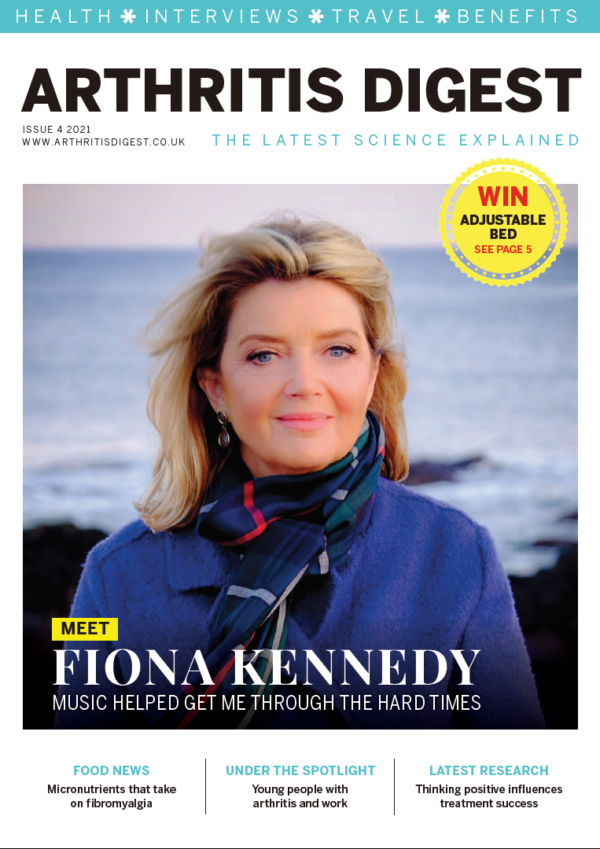Juvenile Idiopathic Arthritis and the world of work – Dr Janet McDonagh speaks to Arthritis Digest
Arthritis Digest is a magazine for people with arthritis that highlights the latest relevant research and reviews topical issues. Continuing regular contributions from our BRC Musculoskeletal theme researchers, Dr Janet McDonagh, Clinical Senior Lecturer in Paediatric and Adolescent Rheumatology, discusses how moving from education into the workplace has a unique set of challenges for young people with arthritis.
Our expectation of milestones we should reach when we are young is fairly rigid. School exams lead to work, perhaps with a stint at college or university in between. In general, it’s pretty straightforward… unless you have a chronic health condition. And one that’s invisible to everyone else can be more challenging still.
Entering the workplace hinges on more than academic grades. Work experience can be vital to getting an interview in the first place. Communication skills are quickly evaluated in an interview situation. Self-esteem and managing expectations come into play too.
For a young person with an invisible condition that involves living with chronic pain, flare-ups of pain and reduced joint mobility mean that actually getting that essential work experience can be difficult.

Self-esteem may well be low at times. Perhaps communication skills have taken a knock along the way as a result. Combined, it can be tricky for young people with arthritis to get a foot on the ladder in the first place.
Once in the workplace, staying there can be difficult, depending on employers, colleagues, and the physical demands of the job.
The Your Rheum Story
Your Rheum is a national youth panel for 11 to 24-year olds with a rheumatic condition, which sits within the Barbara Ansell National Network for Adolescent Rheumatology (BANNAR). The group meets online every six to eight weeks to discuss research at various stages of development, from the initial thinking of research ideas and designing protocols, through to the interpretation and dissemination of results. It was developed through a collaboration between Vocal, researchers and young people living with musculoskeletal conditions to facilitate the ethical and meaningful involvement of young people in BANNAR research programmes. The group meets online every six to eight weeks to discuss research at various stages of development, from the initial thinking of research ideas and designing protocols, through to the interpretation and dissemination of results.
Recently they have been involved with the Work Ready Team at The University of Manchester, who are looking at how health professionals can support this area of life for young people with rheumatic conditions such as juvenile idiopathic arthritis (JIA).
What I want to be when I grow up
Young people with rheumatic conditions have dreams and aspirations for their futures just like other young people, and they can be wide-ranging – from a marine biologist to an astronaut!
But for young people with a rheumatic condition such as arthritis, the question is often “can I still be what I want to be in spite of having this condition?”
Effective careers counselling and appropriate work experience are vital for young people with rheumatic conditions, although unfortunately these are currently highly variable in both availability and quality. Work experience often depends on contacts of parents and the extended family. Work experience needs to be both suitable and appropriate for young people so they can get the most out of it.
When it does exist, careers counselling tends to be very general and fails to address the specific issues facing young people with long-term health conditions. These issues may include physical limitations, fatigue and understanding equality legislation.
Careers counsellors may assume that JIA is just like adult rheumatoid arthritis and not realise that they are very different diseases with different long-term outcomes. These unmet needs can lead to anxiety about possible career choices. But where do they turn to for advice and support to try to allay these fears and anxieties?

Information, advice, and guidance
When the young people in Your Rheum were asked who they would go to for advice and support, the internet came top of the list followed by family and friends, then the rheumatology doctor and nurse, with teachers well down the list. Current evidence, however, has shown that not all health professionals (particularly in paediatrics) feel they have enough knowledge and skill in this area to support young people.
Your Rheum has given our research team a list of people to involve in forthcoming research. This includes teachers and careers counsellors in schools, university disability support services, employers providing work experience, and a range of health professionals such as hospital-based youth workers, occupational therapists, physiotherapists and nurses.
Of note, they also recommended involving professionals who had a health condition themselves, as often these professionals were the most useful source of advice and support to the young people.
The world of education
Development of work readiness obviously starts in education, but young people told us of many issues within settings such as school, colleges, or universities.
One of the main challenges is the lack of understanding of rheumatic diseases from teachers. One young person was marked down in a piece of written work as they needed extra-time. The teacher thought they were being lazy but the fact was the young person had fatigue and pain.
PE teachers in particular need to be educated on the physical limitations of rheumatic diseases.
Many adults think that young people are ‘too young’ for arthritis and have no idea about the way the disease can affect young people. With treatment advances, diseases like arthritis have become “invisible” although significant symptoms such as fatigue, pain, stiffness often remain. Symptoms vary from day to day as well as during the course of a day. The lack of awareness of this variability leads to young people being misunderstood and not believed.
An organisation set up by a young person with Systemic lupus erythematosus (SLE) called Raising Awareness of Invisible Illness in Schools and Education (RAIISE) aims to address this area.
Raising awareness of invisible illness in schools and education (RAIISE) (opens in new window)
RAiISE is launching a resource pack on supporting students with invisible illness in education. The pack has been developed through workshops and conversations with young people aged 5 to 25 years, parents, families, teachers, healthcare professionals and charity representatives. It includes tips for teachers, discussion surrounding communication and a health passport that records the basic details of a student’s condition, what they can do on a good day and what they may struggle with on a bad day.
The university students in Your Rheum highlighted that many young people with rheumatic conditions do not identify as being disabled, and therefore do not seek out advice and guidance from Disability Support Services in universities. Perhaps the latter should consider a name change in order to extend its reach to all young people with long-term health conditions who would benefit from their support.
#DesignforMSK (opens in new window)
#DesignforMSK involved Your Rheum young people in a creative exploration of the daily issues faced by young patients (16-26 years) with musculoskeletal (MSK) conditions. Through a patient-led design process, the project produced and exhibited design solutions to help improve their daily lives. It also attracted a national online audience via social media, gathering wider input to the design process and helping raise public awareness of MSK conditions affecting young people as well as the older population. #DesignforMSK aspired to empower patients to realise that their knowledge and experience of their disease is incredibly powerful and can be used to help others.
The world of work
Young people reminded us, before we think of the world of work, not to forget the actual journey to the workplace. Transport issues are an important area to consider as during rush hour it can be extremely difficult to find seating on public transport.
Key areas in the world of work for young people were those of disclosure and understanding equality legislation. Young people with rheumatic conditions need to understand how to disclose their condition, have the confidence to do so, know what their rights are, and realise the pros and cons of disclosure.
Part of this is understanding that, if they disclose their condition, the school, university, or employer is legally obliged to make reasonable adjustments to support them.
Just as in the case of teachers, employers similarly need to understand the impact of childhood onset diseases such as JIA, and be prepared to make reasonable adjustments in the workplace in order to harness the great potential of these young people.
Top tips for young people getting work ready
- talk about your future with your rheumatology team
- start seeing health professionals independently of your parents for part of your visit. Rheumatology clinics are a safe place to learn how to talk to professionals and will be good for the world of work and future job interviews
- consider how you will tell someone about your condition.
- follow your dreams but don’t forget to think about what adjustments may be needed in the workplace with respect to your health condition
- learn about your rights in the workplace
- check out websites such as youthemployment.org.uk for general advice regarding career searches, youth friendly employers, advice and support
- consider joining Your Rheum – it’s fun, informative and can go on your CV.
The future
Until now, research has largely focused on adults who are employed when they develop arthritis, and how to help them stay in work. Establishing how to help young people with rheumatic conditions to enter employment with limited prior experience of work is just as important.
Hopefully, forthcoming research at The University of Manchester will help identify the barriers to employment typically encountered by young people with rheumatic conditions, raise awareness of the importance of work readiness for young people, and facilitate support from professionals, including rheumatology professionals, so these amazing young people can meet their potential in life.